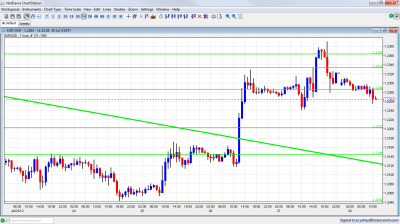EUR/USD started the week by sliding. The close under critical resistance proved to be a bearish signal. Doubts began creeping about what Draghi could actually deliver in the rate decision. The president of the ECB and European leaders pledged to do everything to save the euro, but Germany objects to the most critical measures such as direct and immediate bond buying. Markets remain cautious at the wake of this critical week for the euro.
Here’s an update about technical lines, fundamental indicators and sentiment regarding EUR/USD.
EUR/USD Technical
- Asian session: Euro/dollar opened a bit lower and eventually lost the 1.2288 line.
- Current range: 1.22 to 1.2288.
Further levels in both directions:
- Below: 1.22, 1.2144, 1.2043, 1.20, 1.1876 and 1.17.
- Above: 1.2288, 1.2330, 1.2360, 1.24, 1.2440, 1.2520 and 1.2623.
- 1.2150, a clear historic separator, is again providing support.
- 1.2288 is a weak line of resistance, with stronger resistance at 1.2330.
Euro/Dollar climbs after Draghi remarks – click on the graph to enlarge.
EUR/USD Fundamentals
- 7:00 Spanish GDP. Exp. -0.4%. Actual -0.4%.
- 8:10 Euro-zone Retail PMI. Actual 46.4, lower than last month.
- Italian bond auction: the yield stood on 5.96%, worse than last time.
EUR/USD Sentiment
- Draghi raises the stakes: ECB head Mario Draghi, often criticized for not being more aggressive in tackling the debt crisis, was the darling of the markets as he promised to do “whatever it takes to preserve the euro, and believe me, it will matter”. What is urgently needed is massive bond buying of Spanish and Italian debt, among a wide range of options. See the ECB preview for all the details.
- German opposition: German finance minister Wolfgang Schäuble rejected bond buying by the ECB, and also the conservative central bank in Germany continues rejecting it. The head of the Bundesbank Jens Weidmann and Mario Draghi will meet before Thursday’s decision. Traders should be careful about the market euphoria, as there is good reason to be cautious, if not skeptical about what steps the ECB is prepared to take in to tackle the crippling debt crisis affecting the Euro-zone.
- German data disappoints: If the euro still is a new Deutschmark, there are enough reasons to be worried. German Services and Manufacturing PMIs both came in below the market forecast, indicating weakness in those sectors of the economy. This was followed by an awful Business Climate release, as the indicator fell below the market estimate and hit a two-year low in the process. The markets are clearly getting nervous, as a Germany in decline could spell disaster for the struggling Euro-zone and send the euro tumbling. In addition, Moody’s reduced the outlook on Germany, the Netherlands and Luxembourg from stable to negative.
- Spanish regions weigh on the country: The euro-zone’s fourth largest economy is trying to focus the crisis on the banks, but also its regions are in deep trouble. No less than 6 regions may ask to tap into the national bailout fund. National sentiment is strongly felt in Catalonia. Spanish yields remain at around 7%, and this is clearly unsustainable. Talks about a full sovereign bailout worth 300 billion euros have surfaced. This is in addition to the 100 billion euros for the banks.
- Greece to run out of money on August 20th: Fears of a Greek exit from the Euro-zone have again surfaced. Greece is already running into difficulty meeting its bailout obligations, such as debt-to GDP targets, and this could jeopardize the bailout funds. Germany continues to take a tough line with Greece, as German Vice Chancellor Philipp Roesler warned that Greece must adhere to austerity measures in order to receive bailout funds. Meanwhile, the troika, comprised of the European Commission, ECB and the IMF, are holding talks with the Greek government in an attempt to resolve the latest crisis. Greece announced new austerity measures, but will it be enough to convince the troika? The country has to pay over 3 billion euros to the ECB on August 20th, and doesn’t have the money at the moment.
- Italian situation still troubling: Doubts about Draghi’s seriousness can be seen in his own country. The area’s third largest economy raised money in the markets with a yield of 5.96%, higher than 5.82% seen last time. The specter of early elections in which the anti-euro sentiment will gain traction also weighs on Italy, that now has a debt-to-GDP ratio of 123%.
- Weak US data not enough for QE3: The US continues to produce weak data, with housing data and durable goods posting weak numbers. Growth was slow in Q2: 1.5% according to the first release. This is a favorable situation for the dollar: data is weak enough to show that the US is not an engine of global growth, but not weak enough to trigger dollar printing from the Fed, which will release its latest decision on Wednesday. Markets may be disappointed once again.

